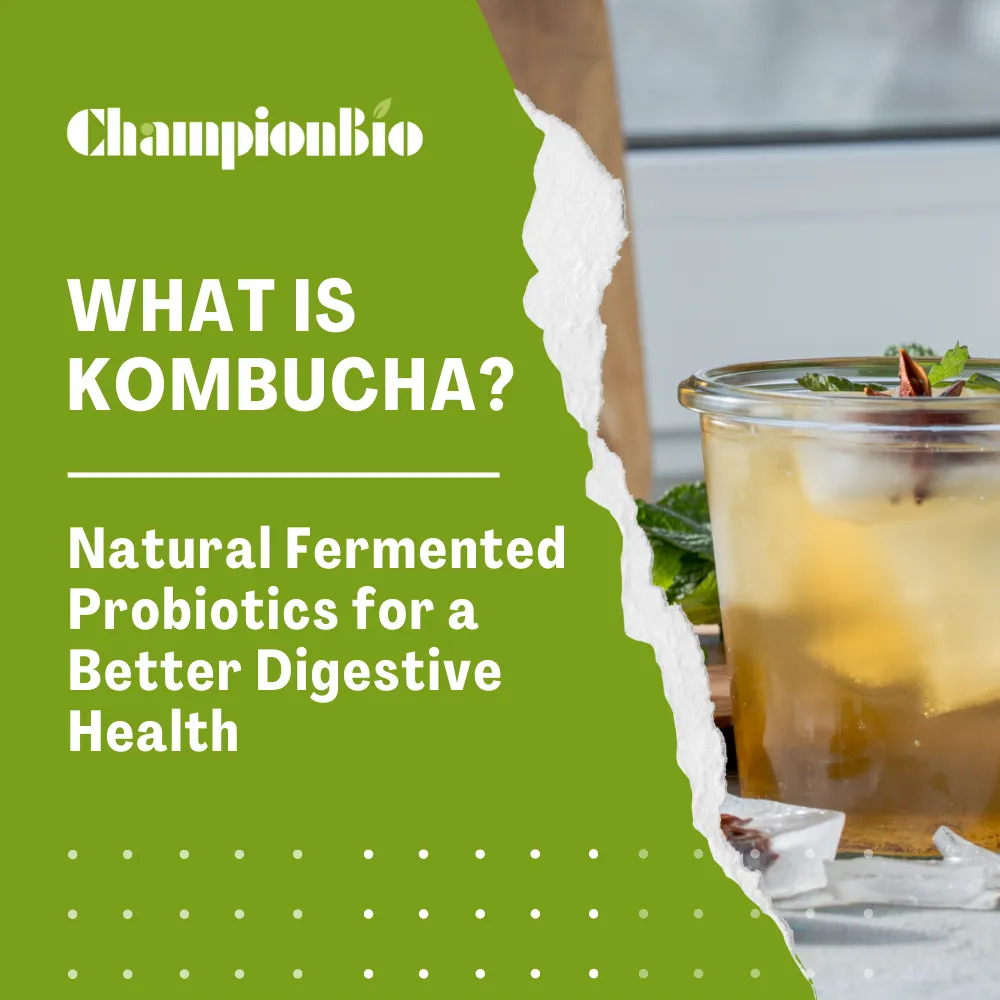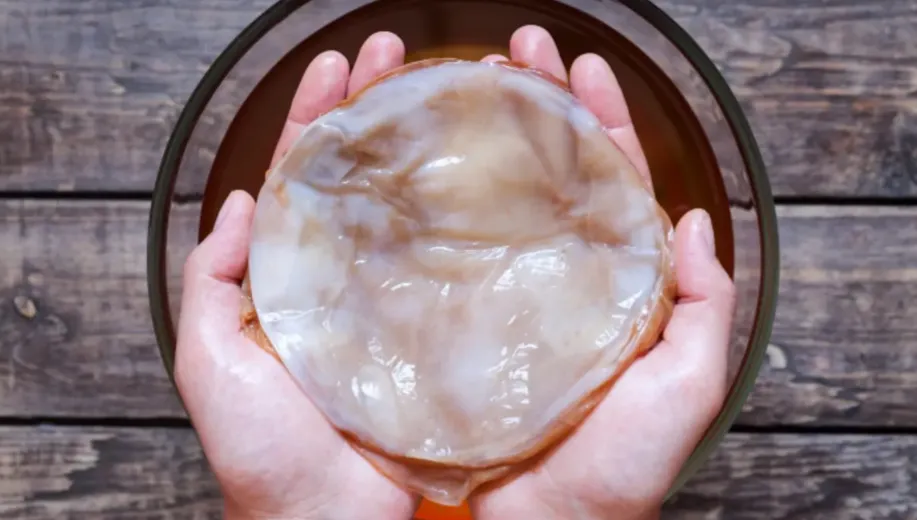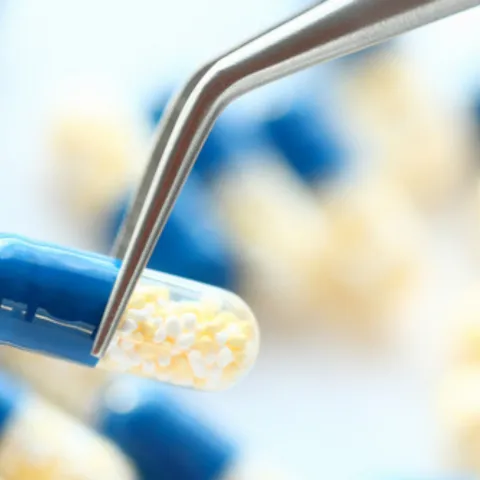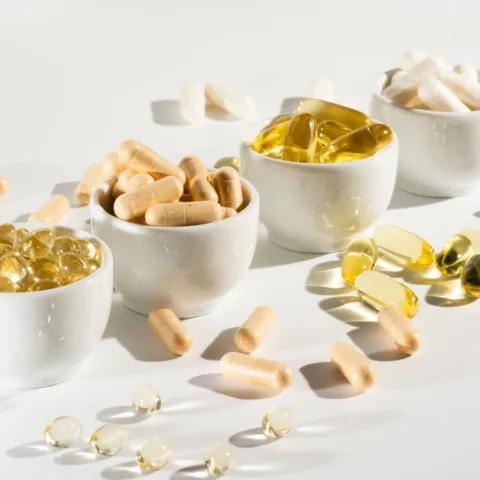What is Kombucha? Natural Fermented Probiotics for a Better Digestive Health

Did you know that the gut, one of the largest organs in the body, is home to 70% of all immune cells? Taking good care of your gut is the first step in improving your body's defense. Health professionals are paying a lot of attention to naturally fermented foods these days as they can boost your gut microbiome, which consists of about 100 trillion bacteria and germs that reside in your digestive system. Kombucha is one of the functional beverages that is fermented for a long time from simple, pure raw materials. As a result, it contains a lot of antioxidants, prebiotics, and natural tea polyphenols. Drinking kombucha regularly can improve one's health and supports digestion and metabolism.
There is a variety of functional drink options available in most markets however, consumers often worry about the low-fiber, high-sugar, and high-calorie beverage options when adding them to their diet. And at this point, kombucha comes to mind as it belongs to none of those categories and there is nothing but benefits of it.
Table of Content
- What is Kombucha?
- Naturally fermented good bacteria: kombucha's possible efficacy analysis
- How to drink kombucha and who is it suitable for? Are there any side effects?
- Does kombucha taste like tea?
- Kombucha Second Fermentation: The Secret to Rich Taste
- Where can I buy kombucha?
- How long does it take for kombucha to expire? How to save within the validity period?
- What is SCOBY? The delicious science of kombucha
- Where to buy SCOBY, kombucha, and kombucha?
- Can kombucha be brewed? How to make kombucha?
What is Kombucha?
Kombucha is a beverage rich in organic acids based on black, green, or oolong tea, fermented with sugar, kombucha (black tea mushroom), and water. Not only does it have the nutritional benefits of tea polyphenols, but also rich in prebiotics/probiotics. It tastes like fruit vinegar, sweet and sour and a bit frizzy. Drinking in moderation helps maintain the normal functioning of the digestive system and improves the bacterial flora of the gut. Although its origin is uncertain, it’s considered Kombucha originated from China and spread to the World along with the silk road.
With the rising trends of health awareness, more people are abandoning unnecessary consumption of refined sugar or additives and choosing options that are less burdensome to their bodies. Kombucha on the other hand, with its simple raw materials, natural taste, and organic compounds, became very popular in European and America. It is popular, and now it has a growing potential in East Asia with its growing popularity, becoming a new choice for quenching thirst in summer.
Is drinking kombucha healthy or not? Is there any scientific basis for its nutritional benefits? Is drinking kombucha dangerous? Or is it just another short-lived wave of healthy eating? This complete guide to kombucha beginners invites you to get to know this refreshing drink!
Naturally fermented, source of good bacteria: Kombucha
Compared with the amount of sugar that is used for packaged drinks, kombucha, which is mainly low in sugar and contains probiotics, is indeed considered a good alternative. Drinking kombucha regularly in moderation can also provide the following health benefits:
1. Boosts metabolism - along with exercise and a balanced diet
2. Rich in prebiotics - substances that help the growth of intestinal probiotics and maintain digestive function
3. Rich in antioxidants
4. A good substitute option for sweetened beverages to reduce calorie intake
5. Contains organic acids that regulate appetite and make bowel movements smoother
In addition to above health benefits, high-quality kombucha has the following 5 nutrients:
1. Vitamin C: A serving of kombucha has about the same amount of vitamin C as the same amount of orange juice, but only one-tenth the sugar.
2. Acetic acid: Creates the sour taste of kombucha, and regular consumption maintains youthful beauty and enhances physical strength.
3. Lactic acid: maintains digestion and smoothes bowel movements.
4. Amino Acids: As the smallest building blocks of protein in the body, amino acids play a vital role in maintaining a healthy body.
How to drink kombucha and who is it suitable for? Are there any side effects?
Kombucha is packed with many nutritional benefits and can almost be called a "functional drink", but is kombucha suitable for everyone?
Generally speaking, doctors do not recommend pregnant women, breastfeeding women, children under five years old, or people using immunity medication to consume kombucha, because kombucha still contains a small amount of caffeine, which may have a diuretic effect, or cause central nervous system damage when used along with certain medications.
Furthermore, considering its fermentative nature, it shouldn't be consumed in a large amount at a time to avoid stomach issues such as nausea or dizziness. If you are new to kombucha, you can start from 200 ml per day. Keep in mind that kombucha should not be left at room temperature for too long to avoid over-fermentation. Otherwise, it might produce too much organic acid resulting in a decreased pH value, therefore your kombucha would not be suitable for drinking. If you have any health concerns or use medication regularly, it is recommended to seek medical advice before adding it to your diet routine.
Does kombucha taste like tea?
Rather than tea, kombucha is closer to a light fruit vinegar or fermented sparkling drink in texture.
If you try kombucha for the first time, you may be surprised by its strong sour taste -or just love it! Many manufacturers will add sugar, fruit juice, or spices after fermentation of kombucha to make it more palatable, but for the original flavor of kombucha, what you should expect is mainly a sour taste, along with a little sweetness, and a slight tea aroma with a unique fermented smell. As for other artificial flavors and unnatural flavors, they will only change the taste, while it's not necessary for any health purposes. In fact, it's better to have the purest version available.
In addition to tea's fragrant fruit acid, you may be curious, where does the fizzy taste like carbonated drinks come from?
Kombucha Fermentation: The Secret to Rich Taste
The reason why kombucha tastes like soda is because of the process of "secondary fermentation".
Unlike sparkling water, where water-soluble carbon dioxide is injected directly, 100% of the bubbles in kombucha are natural products of the fermentation process. The so-called secondary fermentation is that after the kombucha completes the first stage of brewing, the bottle is opened, seasoned, and then allowed to continue to ferment for some time. At this time, the live bacteria in the kombucha will be "awakened" by the added sugar again and generate gas. The gas will continue to accumulate pressure in the sealed bottle and finally, when the can is opened, it will emit a wonderful fizz just like opening a bottle of fine champagne.
As for the bubbles, the amount will vary with the sugar content of each product, the length of the fermentation time, and the temperature during fermentation.
If you wish to add kombucha to your diet but want to make your own,
you might want to check this article and get our kombucha recipe: make homemade kombucha for the first time! Natural fermented drink DIY preparation in advance

What is the shelf life of Kombucha? How to store it and keep it fresh?
Kombucha, like common fermented foods like yogurt, pickles, and cheese, needs to be refrigerated to ensure freshness. Unopened bottles of kombucha can usually be kept for several months, but if you have already opened, it is recommended to drink it as soon as possible. Another reason kombucha must be kept refrigerated is to avoid continued fermentation in the bottle or the growth of bacteria. If kombucha is left at room temperature, it is easy to cause excessive fermentation and excessive gas accumulation in the bottle, and the taste goes sour and unpleasant.
What is SCOBY? The fermentation agent of Kombucha
What is that floating, gelatinous, jellyfish-like object in the bottle?
It is called SCOBY, also known as black tea mushroom and kombucha, which is familiar to all kombucha lovers. It is the abbreviation of "Symbiotic Culture of Bacteria and Yeast" in English. (So black tea mushrooms are not mushrooms, but symbiotic flora!)
If you are drinking kombucha for the first time, don't think it is a harmful impurity, and pour the whole cup into the sink in a hurry. Inextricably linked, it is a natural bacteria membrane that is also the symbiosis of yeast, lactic acid bacteria, acetic acid bacteria, and other beneficial bacteria, and only with it can kombucha have multiple health effects. You can think of kombucha as the sour seed of sourdough bread. After adding it, the dough will slowly ferment and grow; the same is true for kombucha, which cannot start fermentation without adding black tea mushrooms. And of course, it's as harmless as the sour seeds in bread, and it's safe to drink along with kombucha itself.
Where to buy SCOBY, kombucha, and kombucha base?
To make a batch of healthy and delicious kombucha, you first need high-quality kombucha strains and prepare a good environment for them to slowly ferment and grow. However, it is known that no one can grow kombucha out of nothing, except for the first accidental production of kombucha. If you want to make your kombucha batch, you have to find someone who has brewed kombucha and buy a piece of SCOBY; as long as you have this piece, it can multiply indefinitely.
So where can we buy a kombucha base? Besides shopping malls, online communities are as well a great way to get your first SCOBY. Whether it is an amateur or an expert, there are already many home-brewed kombucha enthusiasts around the world and many social media groups online. While obtaining the kombucha strains, you can also exchange information on the steps and practices and share the experience of brewing kombucha with others.
How to brew Kombucha? How to find the perfect recipe for Kombucha?
Here is your homemade kombucha recipe: tea leaves (black tea or green tea or oolong tea) + kombucha membrane (SCOBY) + sugar + filtered water + fermentation broth + fruit juice or natural flavors (optional)
It is not difficult and gives you more flexibility as you can easily adjust it to your favorite flavor and proportion while ensuring the quality of raw materials and pursuing a natural and organic option.
Check this article for a detailed recipe: make homemade kombucha for the first time! The DIY method of natural fermented drinks is open to the public
Above we created a Kombucha encyclopedia compiled for you. Continue checking our blog and learn more about healthy lifestyle with functional ingredients.
Feels like you want to do more than this? If you are planning to invest in Kombucha production and create your own Kombucha brand, we have your superpower to kick start your business! It’s Manna-K kombucha concentrate , with which you can brew high quantity of kombucha in a very short time ensuring the same quality in each brewing. It’s formulated and designed to help you through your professional operation.
Contact us to get more information about Manna-K Kombucha Concentrate!
參考資料
- American Kombucha Homebrew Community KOMBUCHA KAMP
- KOMBUCHA TO THE PEOPLE
- BBC Column Good Food
- Brewing/Fermentation Community Blog Cultures For Health
- Fermented Food Lab Fermented Food Lab
- Canadian kombucha brand Booch Organic Kombucha
- Canadian energy drink brand GT's Living Foods
- Canadian kombucha brand RISE Kimbucha
- Kombucha Bible





















